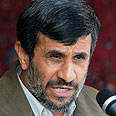
Iran, then and now
Op-ed: Ahmadinejad’s anti-Semitism sharply contrasts with Iranian generosity during Shoah
On Yom Hashoah, Holocaust Remembrance Day, we honor the memory of those who perished in the Nazi campaign to annihilate world Jewry. We honor, too, those Jews and non-Jews who defied the Nazis and saved Jewish lives. Perhaps surprisingly, this list includes Iran.
Iran served as a wartime haven for Jews and furnished the staging ground for a massive program to aid refugee Jews from Nazi Europe.
Today, Iran leads the propaganda battle in denying the Holocaust - an official platform espoused and favored by its president. While Holocaust denial in Europe and elsewhere persists, not withstanding copious and well-documented evidence and decades long German acknowledgement, such denial rests mostly at the racist, anti-Semitic fringe. In Iran, however, denial is a tenet of foreign policy.
During the Holocaust, Iran proved singularly sympathetic in the Muslim world. Its history of help abounds with public actions and private gestures. Most famous, perhaps, is the case of hundreds of Jewish orphans housed in a tent city outside of Tehran until they were allowed to immigrate to Palestine.
Iran’s proud history
Less known but equally significant, the Iranian government permitted Jewish philanthropic organizations to gather supplies from throughout the British Empire in Iran. Aid convoys, organized in Iran by the Jewish Agency for Palestine, delivered life saving packages to needy Polish Jews freed from forced labor in Siberia but left stranded and without support throughout Central Asia.
Iran’s proud history of help for targeted Jews continued in the post-war period, and the government opened its borders to Jews fleeing anti-Semitic violence in neighboring Muslim states. When pogroms against Iraqi Jews erupted in the wake of the establishment of the new state of Israel in 1948, Iran provided a safe haven.
This was public policy, openly announced by no less a figure than Prime Minister Muhammad Said Maragai. “In accordance with the tradition of tolerance, stamped deep into the Iranian nation for 6,000 years, the policy of an open door to political and religious refugees will be continued,” he announced in early 1950. And thus some 20,000 Iraqi Jews smuggled themselves into hospitable Iran and thence, openly, to Israel.
Rewriting the past
How do we square Iran’s beneficent attitude toward Jews then, with its current Holocaust denial and genocidal anti-Israelism now? Iran’s President Mahmoud Ahmadinejad, clearly miserable about the existence of Israel today, politicizes history and memory and, in so doing, has crassly rewritten the past.
History does not give Ahmadinejad the narrative he needs. And so, declaring himself proud of his fierce denial of the Holocaust, he forges the story he wants to tell. However, the facts give grounds for the Iranian people to take pride in their parents’ and grandparents’ generosity towards people - Jews - in dire need. Surely this, too, is a legacy of interest to present day Iranians.
Throughout the Middle East, democracy movements have taken to the streets, demanding government by the people for the people. Yom Hashoah provides an opportunity for ordinary people to claim their history, too; to jettison politically crafted, state-sanctioned narrative in favor of accounts grounded in facts and supported by a convergence of evidence. In Iran’s case, such a history says much about humane action during an inhumane time.
Debórah Dwork is the Rose Professor of Holocaust History, Clark University and Mary Jane Rein, Ph.D., is the Executive Director, Strassler Center for Holocaust and Genocide Studies, Clark University
- Follow Ynetnews on Facebook










